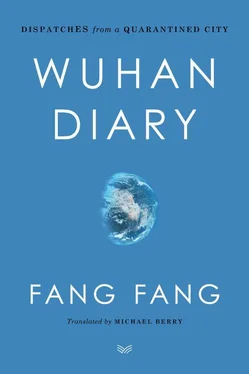Like a lot of other well-known urban cities, Wuhan is not just a commercial hub; it is also an industrial center and a major site for research and education. It has endured the vicissitudes of history and witnessed its share of blood and tears; it has been through the insult of having foreign concessions established here and it has been home to legendary tales of resistance; it has been through a construction boom and also the ridiculous Cultural Revolution; it has been home to heroes and prostitutes; just as the water never stops flowing, so the traffic never ceases and the neon lights never dim; it boasts of luxury hotels and bustling markets; it has beautiful scenes of green trees against both red walls and environmental pollution; it has its quiet, beautiful side; and it is home to both the nouveau riche and the poor and destitute. All the amenities enjoyed by every modern city, along with all the urban problems that big cities face, are all right here in this place called Wuhan.
Reading Wuhan Diary in English is a very different experience than how Chinese-speaking readers experienced it when it first appeared online. The diary was initially released in daily installments that were uploaded to various Chinese social media platforms and microblogging sites like Weibo and WeChat. Fang Fang’s dispatches were blasted out each night, offering real-time responses to and reflections on events and news reports that had transpired just hours earlier. As the outbreak in Wuhan spread and began to attract more attention both within China and globally, Fang Fang’s readership began to grow. More and more Chinese readers from around the world found their way to Fang Fang’s postings, which provided a platform to understand what was happening on the ground in Wuhan. Whereas we often think of diaries as an especially private literary form—a place where you record your innermost fears and desires, often alongside a more mundane record of events from everyday life— Wuhan Diary was a public platform from the very beginning: a virtual open book.
Part of that openness meant that Fang Fang’s diary entries were not read as they are presented here in this volume—that is, compiled into a book-length narrative dominated exclusively by the author’s voice and perspective. For Chinese readers, Wuhan Diary came delivered in many forms—as daily installments on Weibo and WeChat; as excerpts that were cut, pasted, and forwarded via text message; as memes that were culled from entries and paired with photos; and even as PDF compilations that individuals who wanted to document Fang Fang’s entire narrative forwarded to friends via email. Most significantly, on Fang Fang’s primary platforms of Weibo and WeChat, the posts would be accompanied by a comments section, which would variously include remarks, criticisms, links to articles, photos, and embedded videos uploaded by an army of actually millions of readers. According to a Guardian article from April 10, 2020, “On Weibo, ‘Fang Fang Diary’ has had 380m views, 94,000 discussions, and 8,210 original posts, peaking last week.” [1] Helen Davidson, “Chinese writer faces online backlash over Wuhan lockdown diary” in The Guardian . April 10, 2020. https://www.theguardian.com/world/2020/apr/10/chinese-writer-fang-fang-faces-online-backlash-wuhan-lockdown-diary?CMP=share_btn_link .
At the height of the diary’s popularity, many of her posts were getting between 3 and 10 million hits in just the span of two or three days; those message boards emerged as a virtual biosphere of vibrant social debate—a place for readers to converge, share, sometimes argue, and often cry.
While no book, print or electronic, can encapsulate the rich social dimension of Wuhan Diary ’s sprawling digital footprint, readers will be able to sense the presence of that world because as the diary unfolds, Fang Fang increasingly interacts with her many supporters as well as with the trolls who attack her, both of whom become an increasingly important part of the narrative that she weaves. Indeed, even as Wuhan Diary offers manifold insights into the coronavirus outbreak in Wuhan, it offers an equally rich dive into the complex world of the Chinese internet. As the quarantine drags on, Fang Fang finds her life increasingly intertwined into a virtual world of texts, online news clips, and social media posts. But what makes Wuhan Diary such a remarkable document is the way in which Fang Fang merges the firsthand perspective of someone going through the uncertainty, fear, and isolation of life under the shadow of a strange new virus, with online reports, news coverage, texts, and messages received from relatives, friends, colleagues, former classmates from her youth, and neighbors. The result is a hybrid form that alternates between the quotidian and the epic, the mundane boredom of life under lockdown and the ever-expansive network of the World Wide Web. Fang Fang’s diary at times serves as a clearinghouse for suggestions and recommendations on everything from online shopping tips to how to actually save the lives of people with chronic health conditions unable to get care amid the outbreak.
Another remarkable facet of Wuhan Diary consists of Fang Fang’s repeated calls for action and appeals for accountability. This is another area where how we in the West read the book is different than how Chinese readers read it. In the United States and many other Western countries, media thrives on pundits, politicians, and activists criticizing one another, often along party and political lines. Many American and European readers of Wuhan Diary therefore may not fully appreciate the extraordinary courage that Fang Fang displays in her repeated, unflinching calls for local and national officials and specialists who “dropped the ball” to stand up and take responsibility for their missteps. In a society where “keeping your head low and staying out of trouble” serves as the guiding principle for many writers and intellectuals, Fang Fang dared to speak out—and when her critics came after her, she spoke even more loudly.
This also marks a major shift in the tone of the diary itself; for as the COVID-19 outbreak gradually comes under control in Wuhan, Fang Fang goes from chronicling the coronavirus to calling out officials and specialists for their negligence, mistakes, and lack of action. Eventually, Fang Fang homes in on the topic of accountability. Of course, a price must be paid for her outspokenness; as Wuhan Diary progresses and Fang Fang’s calls for justice grow stronger, so too do the attacks of the invisible army of “internet trolls” who have been hounding her. These two forces are, of course, connected. And, for the final third of the diary, much of her focus is spent deflecting the myriad online attacks that she confronts each and every day.
The ultra-leftist groups attacking Fang Fang in China first came after her in 2017 after the publication of her award-winning novel A Soft Burial. The novel offered a penetrating exploration of amnesia as an allegory for suppressing lost pages in modern Chinese history—in this case, the era of the country’s land reform campaign of the late 1940s and early 1950s. Because of that novel’s refusal to read that history along black-and-white binary lines, it became the target of a fierce smear campaign by ultra-leftist groups in China. The novel was eventually pulled from shelves and Fang Fang herself became the target of countless online attacks. Fast-forward to 2020, and those same ultra-leftist groups have now found a new target— Wuhan Diary. The depth and vitriol of these attacks were such that, even as this HarperVia edition of the book was being prepared, leftist attackers waged a media war in China, claiming the book was to be “weaponized” as a tool for the United States to criticize China!
Читать дальше



![О Генри - Закупщик из Кактус-Сити [The Buyer from Cactus City]](/books/405348/o-genri-zakupchik-iz-kaktus-thumb.webp)








